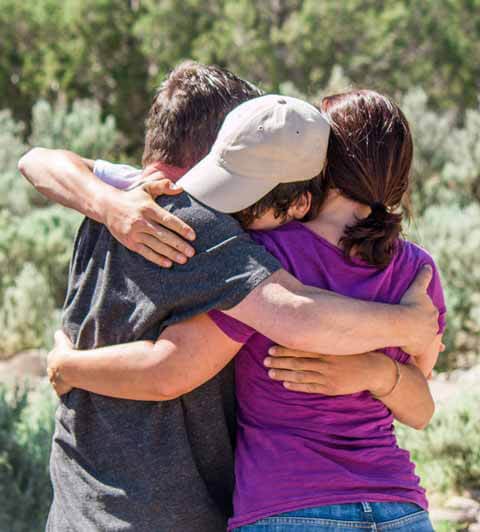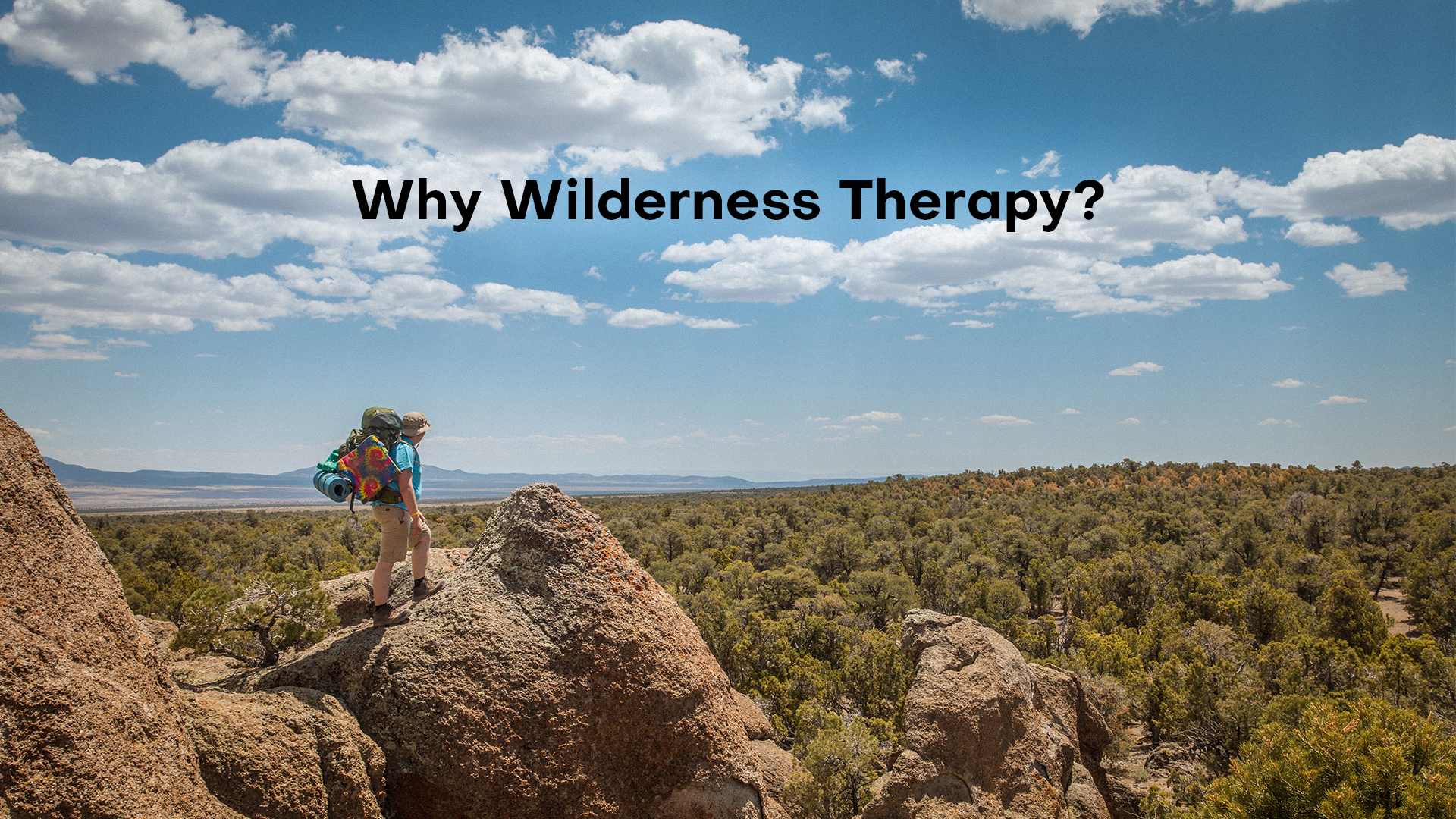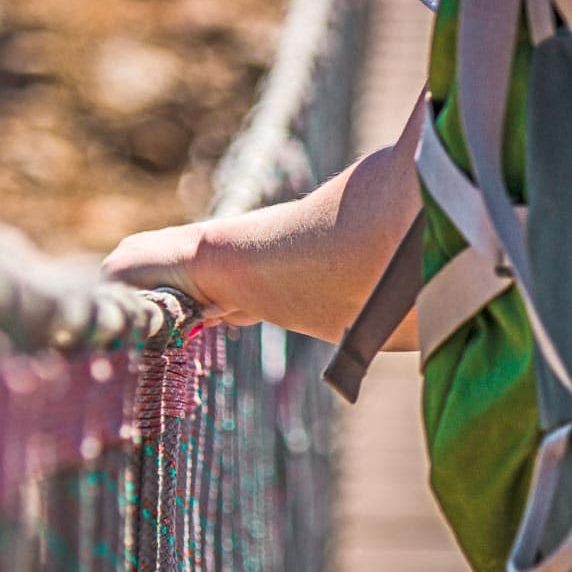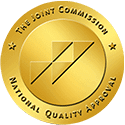
Out-of-Control Teenager Programs: A Parent's Guide to Finding Help
If you're the parent of an out-of-control teenager, you know the stress and frustration that comes with trying to help them. While traditional therapy can be helpful, it may not be enough to address the unique challenges that your teen faces. That's why wilderness therapy is known for being one of the most effective options for parents looking to support their teens and help them get back on track.
Take our assessment for out-of-control teens and see if a wilderness therapy program is right for your family.
Being an out-of-control teenager typically refers to a teenager who is engaging in behavior that is harmful to themselves or others, and that is not in line with socially acceptable norms or family expectations. Out-of-control behavior can take many forms, including but not limited to substance abuse, criminal behavior, defiant or disrespectful behavior, and engaging in risky or dangerous activities.
This type of behavior can indicate deeper issues, such as mental health concerns, difficulty managing emotions, or a lack of guidance or structure. Out-of-control behavior can have serious consequences for the teenager, as well as their family, friends, and future prospects.
Signs Your Out-of-Control Teen May Need Treatment:
The signs of out-of-control behavior in teenagers can manifest in physical, emotional, and behavioral ways. As a parent, it's crucial to be knowledgeable of these warning signs in order to effectively support and guide your teen. The following is a list of common indicators of out-of-control behavior in teens that parents should be aware of.
Here are some common signs that a teenager may be out of control:
- Aggressive behavior or violence toward others
- Running away from home or repeated truancy
- Engaging in dangerous or illegal activities
- Poor academic performance or disinterest in school
- Negative or destructive relationships with peers
- Dangerous or risk-taking behaviors such as reckless driving or unprotected sex
- Defiant or rebellious behavior toward authority figures
- Depression, anxiety, or other mental health concerns
- Self-harm or thoughts of suicide
- Withdrawal from friends, family, or activities they once enjoyed
- Unexplained changes in mood or behavior
- Poor hygiene or grooming
- Sudden changes in eating or sleeping habits
- Disrespect for authority or rules
- Lies or deceitful behavior
- Negative self-talk or low self-esteem
It's important to note that these signs can vary from teen to teen, and that not all out-of-control teens will exhibit every sign. Additionally, these signs may also be indicative of other issues or challenges that the teen is facing. If you're concerned about your teen, it's important to seek professional help as soon as possible.
You Are Not Alone
RedCliff Ascent is there for you and your family.
Types of Out-of-Control Teenage Behaviors
There are two main types of out-of-control behavior in teens:
Dangerous or risk-taking behaviors:
This category includes behaviors that put the teenager or others in harm's way, such as reckless driving, unprotected sex, self-harm, or thoughts of suicide.
Defiant or disruptive behaviors:
This category includes behaviors that show disrespect or defiance towards authority, such as running away from home, truancy, criminal behavior, or aggressive or violent behavior towards others.
This grouping is not exhaustive, and other categories or subcategories may be appropriate depending on the specific situation.
Is it Just Normal Teenage Behavior or Something More?
It can be challenging to distinguish between normal teenage behavior and out-of-control behavior, as adolescence is a time of significant change and development. However, there are some key differences that can help parents identify when a teenager's behavior has crossed a line.
Normal teenage behavior can include:
- Experimenting with new ideas, interests, and identities
- Questioning authority and testing boundaries
- Expressing emotions in intense or dramatic ways
- Seeking independence and privacy
Out-of-control behavior can include:
- Engaging in destructive or self-harmful behaviors
- Exhibiting reckless or criminal behavior
- Consistently disregarding rules or boundaries
- Struggling with school or relationships
- Displaying signs of drug or alcohol abuse
Please seek the advice of a mental health professional if you're unsure about your teenager's behavior, as early intervention and support can make a significant difference in their well-being and future prospects. Additionally, it's important to keep in mind that out-of-control behavior can be a symptom of underlying mental health or developmental issues, and that professional support can help identify and address these underlying causes.
What Causes Teens To Be Out of Control?
There are a variety of factors that can contribute to a teenager becoming out of control, including but not limited to:
- Mental health concerns: Mental health conditions such as depression, anxiety, or ADHD can lead to impulsive or destructive behavior.
- Trauma or adverse childhood experiences: Exposure to traumatic events or difficult childhood experiences can impact a teenager's ability to regulate their emotions and behavior.
- Family dynamics: Family conflict, lack of structure or support, or inconsistent parenting can contribute to a teenager feeling out of control.
- Peer pressure or negative peer influence: Peer pressure to engage in risky or harmful behaviors, such as substance abuse or criminal activity, can contribute to out-of-control behavior.
- Lack of healthy relationships: A lack of positive role models or healthy relationships can contribute to a teenager feeling lost or struggling to find their identity.
- Stress or pressure: High levels of stress or pressure, such as from academics, social pressures, or financial difficulties, can lead to impulsive or self-destructive behavior.
It's important to note that these causes can interact with each other and have a compounding effect, and that the specific causes of out-of-control behavior can vary from teenager to teenager. Additionally, it's important to seek professional help if you're concerned about your teenager's behavior, as early intervention and support can make a significant difference in their well-being and future prospects.
Importance of Early Intervention & Treatment for Out-of-Control Teens
Early intervention is important when helping out-of-control teens because it can make a significant difference in their well-being and future prospects. Some reasons why early intervention is important include:
- Preventing negative consequences: Early intervention can help prevent negative consequences such as substance abuse, criminal behavior, or long-term mental health issues from becoming entrenched.
- Building resilience: Early intervention can help build resilience and coping skills in teenagers, which can help them better manage stress and challenges in the future.
- Improving outcomes: Early intervention can improve a teenager's outcomes, including their academic performance, relationships, and overall well-being.
- Addressing underlying issues: Early intervention can help identify and address underlying mental health or developmental issues, which can be a root cause of out-of-control behavior.
- Improving access to resources: Early intervention can help ensure that a teenager has access to the resources and support they need to overcome challenges and develop positive coping strategies.
- Building trust: Early intervention can help build trust between parents and their teenager, which can be critical in ensuring that the teenager is receptive to support and guidance.
Seek professional help if you're concerned about your teenager's behavior, as a mental health professional can provide tailored advice and support based on the specific needs of your teenager. Additionally, early intervention can be critical in ensuring that your teenager receives the support and resources they need to overcome challenges and reach their full potential.

Not Seeking Treatment Can Be Harmful
The short and long-term effects of leaving out-of-control teenage behavior untreated can be significant and far-reaching. Some of the most common effects include:
Short-term effects:
- Decreased academic performance
- Damaged relationships with peers, family members, and authority figures
- Increased risk of substance abuse and criminal behavior
- Decreased mental health and well-being
Long-term effects:
- Increased risk of ongoing mental health issues
- Decreased life satisfaction and success in personal and professional areas
- Difficulty forming and maintaining healthy relationships
- Increased likelihood of involvement in the criminal justice system
- Substance abuse and addiction
Early Intervention Is Important For Healing Your Teen & Family
Early intervention refers to recognizing the warning signs of out-of-control teenage behavior and acting before it gets worse. When you realize that your teen is struggling, it’s important to get professional treatment before it becomes worse.
Early intervention can help parents and families of out-of-control teenagers in several specific ways, including:
- Providing support and guidance: Early intervention can provide parents and families with the support and guidance they need to navigate the situation effectively. This can include information on effective communication strategies, coping skills, and resources available to help manage the situation.
- Improving relationships: Early intervention can help improve relationships between parents, teenagers, and other family members. This can include teaching parents how to better understand and communicate with their teen while also improving the teenager's relationships with their peers and family members.
- Reducing stress for the whole family: Early intervention can help reduce stress and anxiety for parents and other family members, as well as for the teenager themselves. By receiving support and guidance, families can feel more confident and better equipped to manage the situation effectively.
- Preventing further harm: Early intervention can help prevent further harm to the teenager and the family. This can include addressing behavioral issues before they escalate and helping the teenager access the resources and support they need to overcome challenges.
- Building resilience: Early intervention can help build resilience and coping skills in parents and family members, which can help them better manage stress and challenges in the future.
- Improving overall well-being: Early intervention can help improve the overall well-being of everyone involved. By addressing out-of-control behavior early on, families can take an important step toward promoting positive mental health and well-being for all members of the household.
Plus, it could help reduce long-term medical costs and the overall burden on family and friends. Overcoming out-of-control teenage behavior is possible with the right tools and treatment programs. You can help your teen get the support they need.
Out-of-Control Teenager Programs: What Are Your Options?
Parents of out of control teenagers have a number of options for programs that can help manage their teenager's behavior. Some of the most common options include:
- Outpatient therapy: Outpatient therapy involves regular visits to a therapist for individual or group therapy sessions. This can be an effective option for teenagers who need support and guidance, but who are able to continue living at home and attending school.
- Day treatment programs: These are programs that provide treatment and support during the day, with the teenager returning home in the evenings. They typically provide a structured environment, individual therapy, and group therapy sessions to help teenagers address their challenges and develop coping skills.
- Residential treatment centers: These are facilities that offer 24-hour care and treatment for teenagers with behavioral and emotional challenges. They provide a safe and supportive environment where teenagers can receive individual therapy, group therapy, and other types of treatment to help them overcome their challenges.
- Wilderness therapy programs: These are programs that use the outdoors as a setting for therapy and skill-building. Teenagers participate in activities such as hiking, camping, and team-building exercises to develop problem-solving skills, communication skills, and resilience.
The best option for a particular teenager will depend on their specific needs, challenges, and goals. It's important for parents to work with a mental health professional to determine the most appropriate option based on the teenager's unique circumstances.
What is Wilderness Therapy?
Wilderness therapy is a type of program for out-of-control teens that uses nature, wilderness activities, and therapy as a means to address and heal their individual struggles. Wilderness therapy takes full advantage of the outdoors and its ability to foster change. The outdoors provide teens with a contrasting environment to observe aspects of themselves that are often overlooked in traditional talk therapy.
As the leader in wilderness therapy, RedCliff Ascent is an effective treatment program for struggling teens aged 13-17. RedCliff Ascent’s safe, nurturing, and supportive environment provides teens with the skills they need to cope in a healthy and age-appropriate way.

Benefits of Wilderness Therapy for Struggling Teens
Being immersed in nature can have a profound impact on a teenager. It improves their mental, emotional and physical health. When combined with a trusted clinical approach, a therapeutic wilderness experience helps heal teens and their families. Here are five specific benefits your family can expect to see while your teen is in wilderness therapy.
Out-of-control behavior is often a symptom of deeper mental health struggles rather than the cause of them. Research indicates accurate mental health assessments can lead to a 20% reduction in treatment.
Wilderness therapy provides a novel and challenging environment that disrupts the unhealthy patterns that cause your teen's behaviors or are a result of your teen's out-of-control behaviors.
Out-of-control teens often struggle to engage in ongoing treatment and have very high dropout rates. Poor engagement may lead to worse clinical outcomes, with symptom relapse and rehospitalization. Our research shows that even teens who have been resistant to therapy engage in the process while in wilderness therapy.
RedCliff Ascent’s safe, nurturing, and supportive environment provides teens with the social and emotional learning skills they need to re-engage in healthy development.
If you're like most parents, you don't want to just heal your teen's behavioral struggles. You want them to eventually become thriving, independent adults equipped with the skills necessary to succeed outside your home. These include:
Resilience - the ability to successfully adapt to challenging situations despite risk and adversity. Resilience helps us develop social competence, problem-solving skills, critical consciousness, autonomy, and a sense of purpose.
Leadership & Social Competence skills include qualities such as:
- responsiveness, especially the ability to elicit positive responses from others
- flexibility
- empathy
- communication skills
- and a sense of humor
Problem-solving skills - the ability to plan; to be resourceful in seeking help from others; and to think critically, creatively, and reflectively.
Autonomy is having a sense of one’s own identity and an ability to act independently and to exert some control over one’s environment, including a sense of task mastery, internal locus of control, and self-efficacy. The development of resistance (refusing to accept negative messages about oneself) and of detachment (distancing oneself from dysfunction) serves as a powerful protector of autonomy.
Sense of Purpose and a belief in a bright future, including goal direction, educational aspirations, achievement motivation, persistence, hopefulness, optimism, and spiritual connectedness.
98% of students report feeling connected to RedCliff's staff and one or more of their peers.
Upon completion of the program, 86% of parents reported improvement in their child's problems when compared to when they entered
12 months after treatment 86% of parents reported that their child's problems are improved since they completed treatment
How Does Wilderness Therapy Work?
RedCliff Ascent has helped out-of-control teens for almost 30 years and has conducted research since its inception. Through our research, we have identified seven principles that actually make a difference in helping your whole family recover from your teen's behavioral struggles.

Healthy relationships are not only the foundation for growth and development but the launchpad for a successful future as well.
Your teen will live in a small group where social influence and feedback can be given and received in a safe and supportive way. This safe environment teaches your teen to build healthy relationships with both their peers and mentors. Having the skills to make and keep healthy relationships is essential to overcoming out-of-control teenage behaviors.
Teen treatment is most effective when it is responsive to your teen’s specific struggles, strengths, personality, sociocultural context, and preferences. Our evidence-based treatment approach combines decades of research and clinical expertise to personalize a treatment plan that fits your teen’s unique struggles, characteristics, culture, and preferences.
One common theme in feedback from RedCliff Ascent’s students is that the challenging and novel environment provided them with a new perspective on their life and everything they knew before wilderness therapy.
Novel physical environments are a place of contrast that confront the world views your teen takes for granted. This helps your teen to see with a fresh perspective and see new options available to them. Growth occurs outside of the comfort zone and is accelerated in environments that push physical and mental limits.
Your teen's out-of-control behavior didn't develop in isolation, it affects everyone in your family. The healing process should apply to your whole family as well. Parental involvement and family support during treatment greatly increase your teen’s progress in treatment and helps them to adapt after treatment.
Communicating through handwritten letters provides a novel and powerful way to work through your family's struggles. You will also have access to our parent resource library, a weekly support call with other parents like you, as well as a weekly session with your child's therapist.
Your teen's out-of-control behaviors effect every aspect of their life. The best treatment programs must heal every part of their life as well. They use a holistic and integrated approach so that every aspect of your teen's life can heal from the effects of out-of-control behavior. In our treatment program, mentors, therapists, doctors, nurses, academic directors, nutritionists, and everyone on your teen's treatment team will meet together each week to discuss how to best help your child.
Out-of-control teens struggle to believe in themselves. By teaching basic primitive living skills, teens gain a confidence in themselves that carries on to all aspects of their lives. By knowing that they are able to survive in nature, teens thrive at home, in school, and in their relationships.
A ceremony is a powerful tool that can change your teenager's life. A ceremony is a community celebration or commemoration often having symbolic importance to the people performing it. A ceremony recognizes your teen's inner growth and experiences and attaches it to a physical symbol that your teen can take with them. A ceremony can help your teen validate and internalize the growth they have achieved.
Exclusionary criteria for RedCliff Ascent include:
- Teens younger than 13 and older than 17.5
- Teens with a physical limitation, i.e. wheelchair, crutches, etc.
- Teens with conditions that need intensive medical care or monitoring, i.e. eating disorders, diabetes, etc.
- Teens with a history of violence or sexual assault
- Teens with psychosis or schizophrenia
RedCliff Ascent does not take Medicare or Medicaid.
What Our Clients Say About RedCliff Ascent
I’d like to let you know how delighted I am with the RedCliff program and how impressive the hard work and dedication of the staff is...We feel that your program has very probably saved this child’s life and given us back our son.
- Kathy
We are very pleased with [our daughter's] self-improvements. A year ago we would not have dreamed all this to be possible! The path she head down was self-destruction. The impact of the RedCliff program is what turned [her] around. Our headstrong daughter was able to take stock of her past behavior, deal with her anger towards us, and begin to move in a more positive direction.
Even though sending her to RedCliff was a gut-wrenching decision, we know we did the right thing. We are thankful for the help and insight you gave to her and us.
- Clark and Irene
Since [our son] went to RedCliff we have all been transformed, but none as much as he. All of his teachers had nothing but good things to say about him. There have been no behavior issues at school this year. As a matter of fact, his teachers stated that they would like it if they had more students like Rob in their classes. I cried again at this meeting, but this time they were tears of joy.
- Julie


Backed by The Joint Commission which ensures programs adhere to the highest quality of clinical and medical practices.

Designated as a NATSAP Research Program, showing our commitment to well-researched practices in our program.

We are also OBH Accredited through the Association of Experiential Education (AEE) which regulates wilderness therapy practices.

Full member of the National Association of Therapeutic Schools and Programs (NATSAP), which ensure regulation of programs that serve children and adolescents.

RedCliff Ascent is fully licensed in the state of Utah.

Backed by the Association of Experiential Education (AEE) that ensures programs maintain appropriate professional behavior and risk management.

Founding member of the OBH Council (Outdoor Behavioral Healthcare Council).

Founding member of Choose Mental Health, guiding families with questions about mental health.
Every teen’s strengths and challenges are different. Complete the no-obligation teen assessment below to help us understand your family’s needs.
We respect your privacy and will never share your information.
We’re here to help - take the first step and contact us to see if wilderness therapy could be the path to healing for your family.
